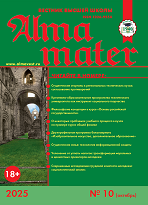UDC 378:32-054
https://doi.org/10.20339/AM.11-21.085
E.I. Vasileva is Cand. Sci. (Sociology), Ass. Prof. e-mail: vsilieva-ei@ranepa.ru; T.E. Zerchaninova is Cand. Sci. (Sociology), Ass. Prof., Head. of sub-faculty e-mail: zerchaninova-te@ranepa.ru; and A.S. Nikitina is Cand. Sci. (Sociology), Ass. Prof. e-mail: nikitina-as@ranepa.ru All at Russian Presidential Academy of National Economy and Public Administration (RANEPA)
Presented is the research in a large number of studies, devoted to the study of state policy in relation to compatriots living abroad, at the same time, today there are practically no data on the state and assessment of the state and non-state support. In this regard, the authors have classified the forms of support into two groups - state and non-state, investigate the specific features of these forms of support, and analyze their effectiveness. Empirical analysis carried out in this research study includes qualitative data from expert interviews collected in 2021. In total, 31 interviews were conducted with experts from sixteen countries (Russia, Ukraine, Republic of Kazakhstan, Republic of Moldova, Republic of Kyrgyzstan, Armenia, Tajikistan, USA, Germany, Czech Republic, Turkey, Great Britain and Northern Ireland, Cyprus, Panama, Uganda, New Zealand). Representatives of Russian and foreign public authorities, heads of the Coordination Councils of organizations of Russian compatriots abroad, heads of Russian youth public organizations abroad, heads of higher educational institutions, teachers and educators, and public figures acted as experts. In conclusion, the authors summarize the effectiveness of state and non-state support for young students of compatriots abroad, form a set of practical recommendations for improving these forms of support.
Key words: young compatriots, student youth, Russian Diaspora, integration, identity, state and non-state support.
References
- Support for compatriots abroad. Official site of Rossotrudnichestvo. URL: http://www.rs.gov.ru/ru/activities/5 (accessed on: 20.08.2021).
- Beschastny, M.V. Russian world as a geopolitical project. Scientific, technical and economic cooperation of the Asia-Pacific countries in the XXI century. 2021. Vol. 2. P. 96–99.
- Bezgacheva, V.V. State policy of the Russian Federation to support foreign compatriots: content and implementation mechanisms (on the example of the Siberian Federal District in the 2000s). Bulletin of Tomsk State University. 2016. No. 411. P. 28–33.
- Vasiliev, M.V. The Russian World and the Problems of Integration of the Post-Soviet Space. Archon. 2021. No. 3 (24). P. 42–44.
- Gerasimova, V.A. Russian compatriots abroad. Post-Soviet studies. 2019. Vol. 2. No. 1. P. 904–921.
- Who and what is behind the doctrine of the Russian World? Interview with P. Shchedrovitsky. Russian Archipelago. URL: http://www.archipelag.ru/ru_mir/history/history99-00/shedrovicky-doctrina (accessed on: 15.08.2021).
- Merkulova, A.P. Constitutional and legal characteristics of the state policy of the Russian Federation in relation to compatriots abroad. Modern society and law. 2013. No. 1 (10). P. 77–90.
- Prokhorenko, A.V., Ilinskaya, D.R. Improving state policy on interaction with compatriots abroad: the experience of St. Petersburg. Management consulting. 2016. No. 4 (88). P. 80–89.
- Salnikov, V.I., Bespalova T.V. The Russian World in the Conditions of Turbulence of the World Political System: In Search of Research Methodology. Cultural Heritage of Russia. 2019. No. 3 (26). P. 20–25.
- Tarkhanova, E.I. Evolution and the main directions of optimization of the policy of the Russian Federation in relation to compatriots living abroad. Questions of political science. 2016. No. 4 (24). P. 106–123.
- Kolstø, Pål. 1995. Russians in the Former Soviet Republics. London / Bloomington: Christopher Hurst / Indiana University Press.
- Laitin, David. 1998. Identity in Formation: the Russian-speaking Populationsin the Near Abroad. Ithaca: Cornell University Press.
- Galdbreath, David J. 2005. Nation-building and Minority Politics in Post-socialist States Interests, Influence and Identities in Estonia and Latvia. Stuttgart: Ibidem-Verl.
- Cheskin, Ammon. 2015. Identity and Integration of Russian Speakers in the Baltic States: A Framework for Analysis, Ethnopolitics. No. 14 (1). P. 72–93.
- Zerchaninova T.E., Nikitina A.S. State policy to support young compatriots abroad. Management issues. 2019. No. 4 (40). P. 26–33.
RFBR, project No. 20-011-00760.











.png)






